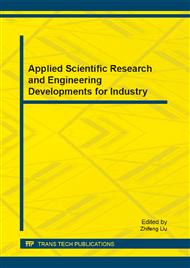[1]
InderfiIrth K,Van der Laan E: Leadtime Effects and Policy Improvement for Stochastic Inventory control with Remanufacturing. International Journal of Production Econmics,200l, p.381—390.
DOI: 10.1016/s0925-5273(00)00135-3
Google Scholar
[2]
Kiesmuller G P. A : New Approach for Controlling a Hybrid Stochastic Manufacturing Remanufacturing System with Inventories and Different Leadtimes, European Journal of Operational Research, 2003, p.147: 62-71.
DOI: 10.1016/s0377-2217(02)00351-x
Google Scholar
[3]
Van der Laan E, Salomon M, Dekker R: An Investigation of Lead Time Effects in Manufacturing/Remanufacturing Systems under simple PUSH and PULL control strategies, European Journal of Operational Research, 1999, 115, pp.195-214.
DOI: 10.1016/s0377-2217(98)00108-8
Google Scholar
[4]
P. Sasikumar,A. Noorul Haq: Integration of Closed Loop Distribution Supply Chain Network and 3PRLP Selection for the Case of Battery Recycling, International journal of production research, 2011, 49(10/11), pp.3363-3385.
DOI: 10.1080/00207541003794876
Google Scholar
[5]
Ezutah Udoncy Olugu, Kuan Yew Wong: An Expert Fuzzy Rule-based System for Closed-loop Supply Chain Performance Assessment in the Automotive Industry, Expert Systems with Application, 2012, 39(1), pp.375-384.
DOI: 10.1016/j.eswa.2011.07.026
Google Scholar
[6]
Savaskan, RC; Bhattacharya, S; Van Wassenhove, LN: Closed-loop Supply Chain Models with Productre Manufacturing, Management Science, 50, 2, pp.239-2004, 2.
DOI: 10.1287/mnsc.1030.0186
Google Scholar
[7]
X. -Y. Huang,N. -N. Yan,R. -Z. Qiu: Dynamic Models of Closed-loop Supply Chain and Robust H_∞ Control Strategies, International journal of production research, 2009, 47(9), pp.2279-2300.
DOI: 10.1080/00207540701636355
Google Scholar
[8]
Subrata Mitra. Inventory: Management in a Two-echelon Closed-loop Supply Chain with Correlated Demands and Returns. Computers Industrial Engineering, 2012, 62(4), pp.870-879.
DOI: 10.1016/j.cie.2011.12.008
Google Scholar
[9]
Suiming Gang: Closed-loop supply chain inventory optimization model (in Chinese), Shanghai: Tongji University, (2008).
Google Scholar
[10]
Zhao Xiaomin, Huang Peiqing, Luo Jianwen: Improvement strategy based hybrid manufacturing / remanufacturing systems analysis(in Chinese), China Management Science, 2007, 15 (4) , pp.34-41.
Google Scholar
[11]
Inderfurth K: Simple Optimal Replenishment and Disposal Policies for a Product Recovery System with Lead Times, European Journal of Operational Research, 1997, 19, pp.111-122.
DOI: 10.1007/bf01545510
Google Scholar
[12]
Kiesmuller G P: Optimal Control of a One Product Recovery System with Llead Times, International Journal of Production Economics, 2003, pp.81-82: 333-340.
DOI: 10.1016/s0925-5273(02)00329-8
Google Scholar
[13]
Dejonckheere J, Disney SM, Lambrecht M R: The impact of in formation enrichment on the bullw hip effect in supply chains: A control engineering perspective, European Journal of Operational Research, 2004, 153 (3), p.727~ 750.
DOI: 10.1016/s0377-2217(02)00808-1
Google Scholar


